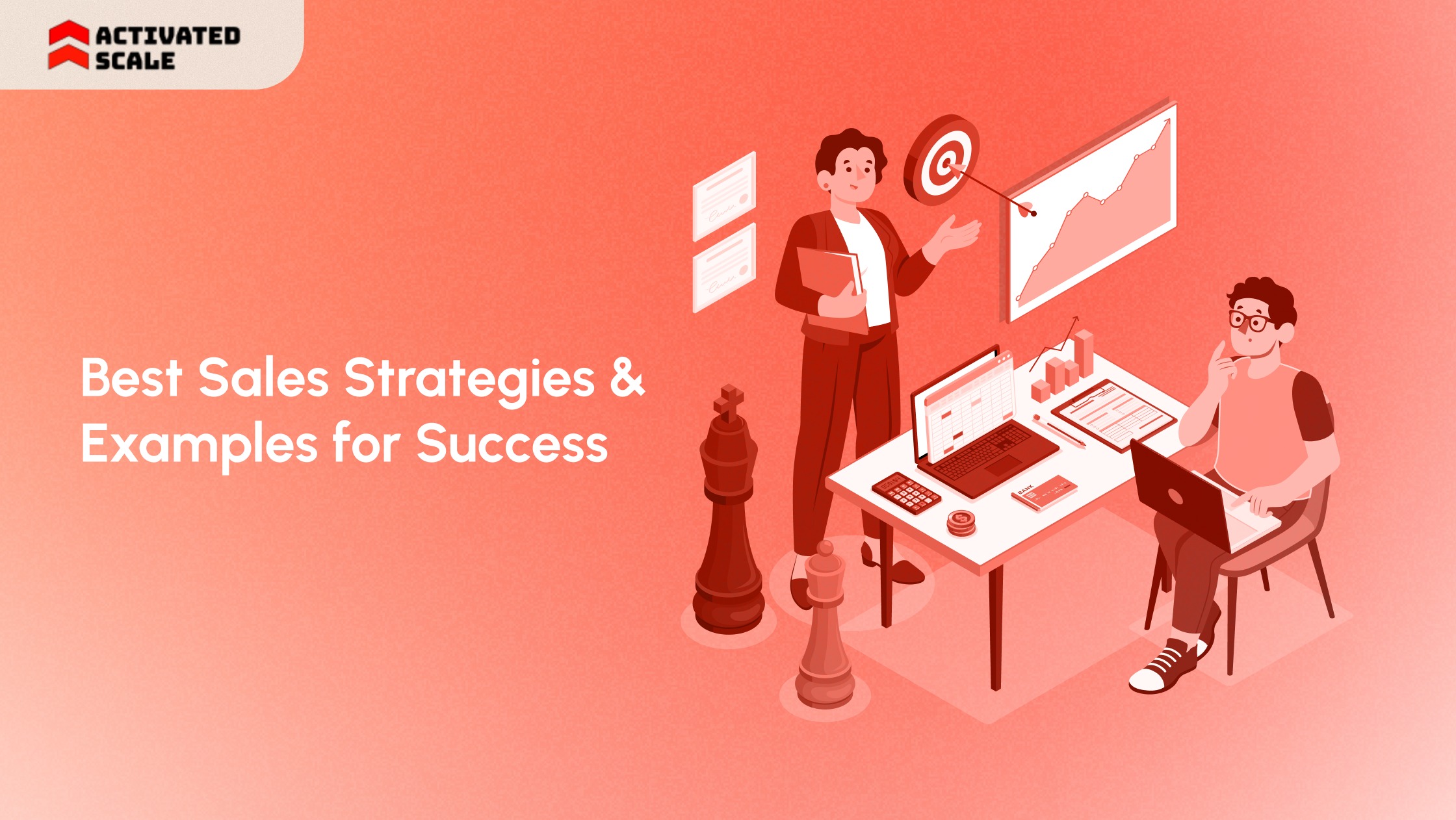Ready to supercharge your B2B sales game? Let's dive into the world of B2B sales agencies, where excellence isn't just a goal—it's a strategy!
A B2B sales agency specializes in helping businesses sell their products and services to other businesses. Unlike B2C (business-to-consumer) sales, B2B sales involve more complex processes, larger transactions, and longer sales cycles. The primary goal of a B2B sales agency is to streamline these processes, enhance lead generation efforts, and ultimately drive revenue growth for their clients.
This blog explores the multifaceted role of B2B sales agencies, the nuances of managing long sales cycles, key elements of B2B sales enablement, and effective lead generation strategies.
Understanding the B2B Buying Group
The B2B buying process is intricate, typically involving a diverse group of stakeholders, known as the buying group. This group includes executives, managers, and end-users, each bringing unique perspectives and concerns to the table. Executives focus on strategic alignment and ROI, managers emphasize implementation and operational efficiency, while end-users are concerned with usability and practicality. For a B2B sales agency, understanding these dynamics is critical.
Effective strategies must address the distinct needs and influence of each group member, ensuring the proposed solution resonates with all parties. By catering to their diverse interests, the agency can foster consensus and drive successful decision-making.
Also Read: How to Build an Effective Sales Process: Your Blueprint for Success
Now, let’s delve into the strategies for managing those notoriously long B2B sales cycles.
Strategies for Managing Long Sales Cycles
B2B sales cycles are inherently long and involve numerous interactions and decision points. Managing these extended cycles requires a strategic approach:
Skillfully Navigating Multiple Interactions
Each interaction is a pivotal opportunity to influence the decision-making process. Sales representatives must skillfully navigate these interactions, addressing concerns, answering questions, and highlighting the benefits of their solution.
Maintaining Engagement
Keeping prospects engaged throughout the lengthy sales cycle is crucial. This can be achieved through regular touchpoints such as calls, emails, and meetings. Personalized communications tailored to the prospect's specific needs and timely follow-ups help maintain momentum and demonstrate attentiveness.
Providing Consistent and Relevant Communication
Consistency in messaging builds trust and credibility with the prospect. Tailoring communication to the specific stage of the buying process ensures that the information is relevant, addressing the current concerns and questions of the prospect. This increases the likelihood of conversion by demonstrating an understanding of their needs.
Building Strong Relationships
Strong relationships are the backbone of successful B2B sales. Sales representatives should focus on building rapport with the prospect, understanding their pain points, and positioning their solution as the best fit for their needs. By fostering trust and demonstrating genuine interest in the prospect’s success, sales representatives can create lasting relationships that lead to successful sales.
With Activated Scale, you get access to seasoned sales talent adept at building these crucial relationships.
Also Read: The 7 Biggest Hurdles to Hiring Startup Sales Talent & How to Overcome Them
Speaking of which, let’s explore the key elements that equip a B2B sales team for success.
Elements of B2B Sales Enablement

Sales enablement involves providing the sales team with the resources, tools, and information they need to sell more effectively. Key elements include:
Thought Leadership
Establishing the company as an industry leader through insightful content, research, and thought-provoking discussions helps build credibility and trust. This can be achieved through publishing articles, conducting webinars, participating in industry events, and sharing expert opinions. Thought leadership positions the company as a trusted authority, making prospects more likely to engage.
Content for Sales
High-quality content that addresses the needs and concerns of the buying group is essential. This includes case studies that demonstrate the solution’s impact, whitepapers that provide in-depth analysis of relevant topics, and tailored presentations that speak directly to the prospect's specific challenges. Such content supports the sales team by providing valuable information that can be shared at various stages of the buying process.
Messaging
Clear and consistent messaging that resonates with the target audience is crucial. This involves compellingly articulating the value proposition, highlighting the unique benefits of the solution, and differentiating it from competitors. Consistent messaging across all touchpoints reinforces the brand and ensures that prospects receive a cohesive and persuasive narrative.
Engagement Journeys
Mapping out the customer journey and creating engagement plans for each stage ensures that prospects receive the right information at the right time. This includes understanding the stages a prospect goes through, from awareness to consideration to decision, and providing tailored content and interactions at each stage. An effective engagement journey keeps prospects moving forward in the sales funnel.
Account-Based Marketing (ABM)
Focusing on high-value accounts and creating personalized marketing campaigns for each can lead to higher conversion rates and more significant deals. ABM involves identifying key accounts, understanding their specific needs, and crafting targeted campaigns that address those needs. This personalized approach builds stronger relationships with key accounts and increases the likelihood of closing large deals.
Marketing to Sales Alignment
Ensuring that marketing and sales teams are aligned in their goals, strategies, and messaging is vital for a cohesive and effective approach. This alignment involves regular communication, shared objectives, and collaborative planning. When marketing and sales work together seamlessly, it leads to more effective lead generation, smoother handoffs, and higher conversion rates.
Lead Recycling
Not all leads convert immediately. Effective lead recycling involves re-engaging with prospects who were not ready to buy initially but may be in the future. This can be done through ongoing nurturing campaigns, keeping the company top-of-mind until the prospect is ready to move forward. By staying in touch and providing value over time, previously cold leads can be reactivated and turned into opportunities.
Lead Scoring
Implementing a lead scoring system helps prioritize leads based on their likelihood to convert. Lead scoring assigns values to leads based on their behavior, engagement, and fit with the ideal customer profile. This ensures that sales efforts are focused on the most promising opportunities, allowing sales teams to prioritize their time and resources effectively.
Sales Nurturing
Continuous nurturing of leads through personalized follow-ups and relevant content keeps prospects engaged and moves them closer to a purchasing decision. This involves regular communication tailored to the prospect's interests and stage in the buying process. By providing valuable information and addressing concerns, sales nurturing builds trust and helps prospects feel confident in their decision to buy.
Activated Scale's personalized sales nurturing techniques build trust and guide your leads toward a confident purchasing decision.
Also Read: Powering Your Sales Team: Why Hiring a Top-notch Account Executive is Crucial for Growth
Now that we’ve discussed sales enablement let’s move on to the strategies that drive successful lead generation.
Key Strategies for Lead Generation
Lead generation is the lifeblood of any B2B sales agency. Effective strategies include:
- Identify the Target Audience: Identifying and targeting the right audience is crucial. This involves understanding the ideal customer profile and tailoring lead-generation efforts accordingly.
- Utilizing Analytics for Lead Identification: Data analytics can provide valuable insights into potential leads, helping to identify those who are most likely to convert.
- Effective Use of Content Marketing: Creating and distributing valuable content that addresses the pain points and interests of the target audience can attract and engage potential leads.
- Role of Social Media in Lead Generation: Social media platforms offer powerful tools for reaching and engaging with prospects. Regularly sharing content, participating in industry discussions, and leveraging social media ads can drive lead-generation efforts.
- Implementing Email Marketing Campaigns: Personalized email campaigns that provide value and address the recipient’s needs can effectively nurture leads and move them through the sales funnel.
- Optimizing Website for Lead Capture: A well-optimized website with clear calls-to-action (CTAs), landing pages, and lead capture forms is essential for converting visitors into leads.
- Utilizing SEO for Greater Visibility: Search engine optimization (SEO) ensures that the company’s website ranks highly in search results, increasing visibility and attracting organic leads.
- Using CRM Systems for Lead Management: Customer relationship management (CRM) systems help track and manage leads, ensuring that no opportunities are missed and enabling personalized communication.
Conclusion
To transform your B2B sales process and drive consistent growth, consider the power of strategic planning, effective sales enablement, and targeted lead generation. The importance of understanding the B2B buying group, managing long sales cycles, and enabling sales teams cannot be overstated. Effective lead-generation strategies powered by data analytics, content marketing, social media, email campaigns, SEO, and CRM systems are essential for attracting and converting high-quality leads. Aligning marketing and sales efforts ensures a cohesive approach that maximizes success.
For startups and small businesses seeking reliable access to seasoned sales talent, Activated Scale is the go-to platform. Offering cost-effective solutions for lead generation and sales cycle management, Activated Scale empowers businesses to scale efficiently.
Contact Activated Scale today to discover how we can help you drive growth and achieve your sales objectives.
The Ultimate Guide to Hiring a Salesperson!
Get the step-by-step guide to hiring, onboarding, and ensuring success!
_edi.png)




